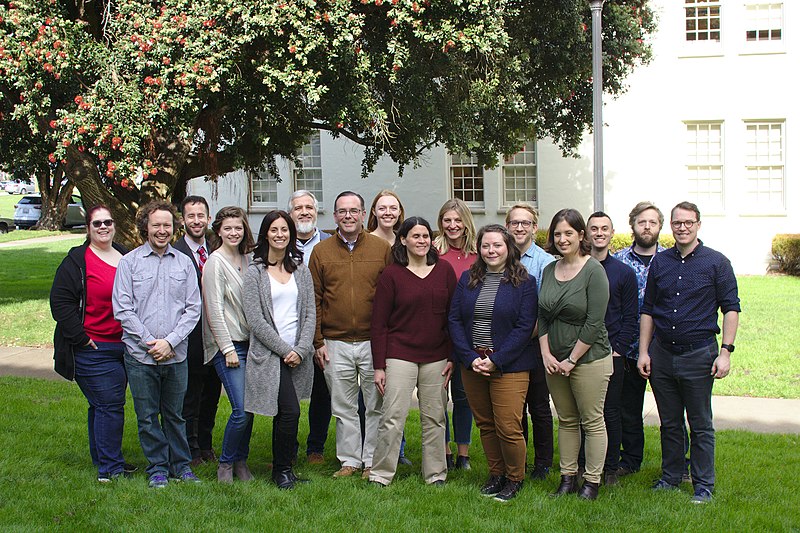Highlights
- In February, Wiki Education formally started a partnership with the Conference on College Composition and Communication (CCCC). CCCC is a professional organization of scholars and teachers of composition and rhetoric, advocating for broad and evolving definitions of literacy, rhetoric, and writing. The organization wants to encourage its membership to participate in Wiki Education’s programs to increase their members’ confidence editing Wikipedia and thereby support expert contribution to this global, public resource. CCCC will encourage its members to use Wikipedia as a teaching tool, helping students develop their media and digital literacy. CCCC will also encourage interested members to join a Wiki Scholars course, becoming Wikipedians themselves. The Wikipedia committee of the organization comprises several instructors in our Student Program, so we’re encouraged to see those champions bring Wikipedia to more instructors and students within the discipline. In addition to CCCC partnership, we also formalized a collaboration with the Society of Family Planning, an organization that will facilitate its members learning how to contribute scientific knowledge to Wikipedia through our Wiki Scientists courses.
- In February, we received a grant from the Stanton Foundation totaling $400,000. We received the first payment of this grant, totaling $233,000, as a match to the first payment for our Annual Planning Grant from the Wikimedia Foundation’s Fund Dissemination Committee, which was received in January. Also, Chief Advancement Officer TJ Bliss traveled to Savannah, GA, USA to attend a meeting hosted by the William and Flora Hewlett Foundation for all of its Education Program grantees. At this meeting, TJ connected with people from all over the world and had several opportunities to discuss Wiki Education’s work. Several people were interested in follow-up conversations and potential partnerships, especially related to our Scholars and Scientists program.
- On our blog this month, Wikipedia Expert Ian Ramjohn made a great case for why scientists should be writing Wikipedia. He walks through an MIT study from 2017 that concludes that Wikipedia articles influence published scientific research. When scientists don’t engage in Wikipedia editing, they are not only out-sourcing the public communication of science to Wikipedia volunteers, they are also outsourcing communication within their field. Scientists can now learn how to join the conversation that Wikipedia fosters by joining our virtual Wikipedia writing courses!
Programs
Before Wiki Education’s All Staff, the Programs team gathered for an offsite in Pacifica, California. As a group, we reached shared understanding of how our team is implementing Wiki Education’s new strategy through our programs, and reviewed all the current requirements, goals, and work that needs to be done for our existing grants. The Wikipedia Experts and Program Managers then split into sub-groups to better facilitate working together moving forward. It was a good opportunity to reconnect as a team and reach shared understanding before we go into the annual planning process for next year.
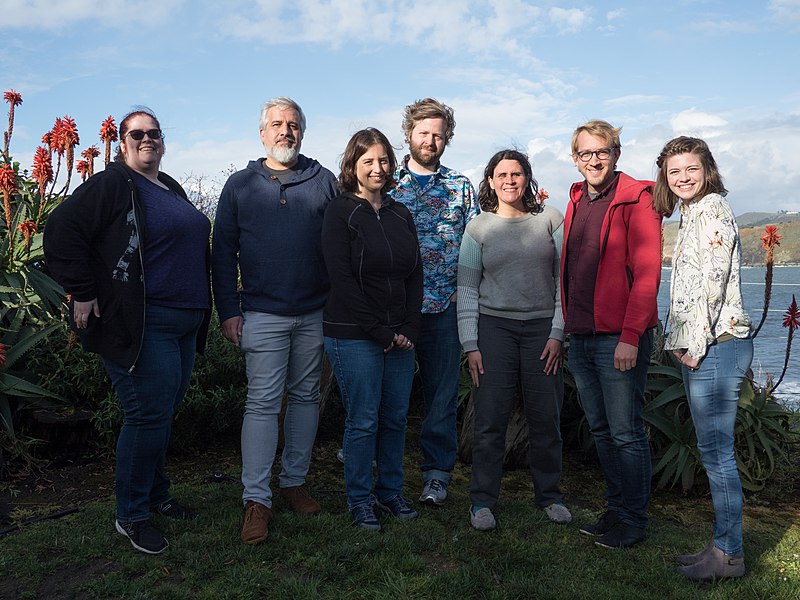
Wikipedia Student Program
Status of the Wikipedia Student Program for Spring 2019 in numbers, as of February 28:
- 333 Wiki Education-supported courses were in progress (198, or 59%, were led by returning instructors)
- 6,260 student editors were enrolled.
- 59% of students were up-to-date with their assigned training modules.
- Students edited 2231 articles, created 128 new entries, and added 945,000 words.
While most of our courses were just getting started in February, courses on the quarter system were busy moving forward with their Wikipedia assignments. This means that they were drafting their contributions and beginning to move them to the article main space.
Courses continue to roll in as spring quarter approaches, and Wikipedia Student Program Manager Helaine Blumenthal was busy making sure that all courses have a well set up course page. Helaine also spent a good deal of time working on an entirely revamped instructor survey that we’re excited to launch this term.
Student work highlights
In Rachel Van’s Early American History Graduate Seminar at Cal Poly Pomona, one student chose to write about Emma Fielding Baker, a tribal historian for the Mohegan Pequot tribe who was also posthumously awarded the title of Mohegan medicine woman. Baker was born in 1828, a time where Native Americans were expected and pressured to assimilate into white Christian culture. Children were sent to and boarded in Indian schools, where their real, tribal names and cultural identities were stripped from them and many faced verbal, physical, and sexual abuse. This would in turn threaten the tribes’ ability to pass down their culture and history, all while more and more land was taken from the tribes. Aware that there was a need to preserve tribal historical records and oral traditions, Baker stepped forward to be the “culture bearer” and also sought to protect Mohegan land and sacred sites. Aside from expanding the article, the student also approached the Mohegan tribe to gain access to photographs of Baker for the article, seeking to improve the article while also showing respect for the tribe. Accompanied here is one of these images.
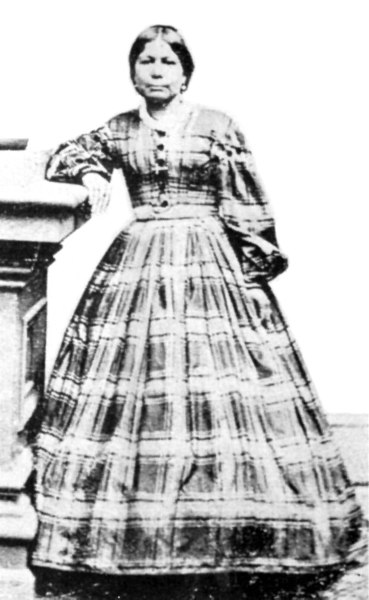
Students have a lot to contribute to Wikipedia and the Brigham Young University students in professor Mac J Wilson’s Spanish American Culture and Civilization class are no exception. One student created a new article on the April 19 University Movement, a Nicaraguan student-led movement protesting the government of President Daniel Ortega, who had previously served as the President from 1979-1990, after the Nicaraguan Revolution. The students had participated in the 2018 Nicaraguan protests, where they stated that police repression during the event led to multiple deaths. Other stated causes for the movement include claims of the existence of political prisoners and the violation of human rights by the government. In response the Nicaraguan government has labeled the movement a terrorist group, accusing them of various crimes that includes torture, murder, and trafficking.

Image: File:Ida Mary Roper.png, University of Leeds Archives, CC BY 2.5, via Wikimedia Commons.
Ida Mary Roper was a trailblazing woman scientist. However, if you visited her Wikipedia page before February, you would have seen only one sentence about her life. Thanks to the work of a student editor in Christiana MacDougall’s Gender and Science course, readers can learn more about her life and accomplishments. She was born in 1865 in Great Britain—a time when women could not easily pursue scientific careers. In 1913, she became the first woman president of the Bristol Naturalists Society. She was also the first woman elected to the Council of the Bristol and Gloucestershire Archaeological Society! Women’s stories are often underrepresented on Wikipedia; students perform a remarkable and important service by expanding them.
Margaret Crosfield was a pioneering woman geologist who was elected to the British Association for the Advancement of Science in 1894 and was one of the first six women elected
Fellows of the Geological Society of London in 1919. Had you visited her Wikipedia biography before a student in Glenn Dolphin’s Introduction to Geology class edited the page, you would have learned about these kinds of achievements, but you would not have known why she merited this recognition. Thanks to a student in the class, her biography now discusses her education, her career, and her contributions to the field of geology. Similarly, if you had visited Helen M. Martin‘s biography before this term, you would have gotten a far more incomplete picture of her career and contributions to the field of geology. Other student editors in the class improved biographies of other women geologists including Sharon Mosher, Florence Bascom and Nancy Kirk, while others created biographies for Rhea Lydia Graham and Diane Loranger.
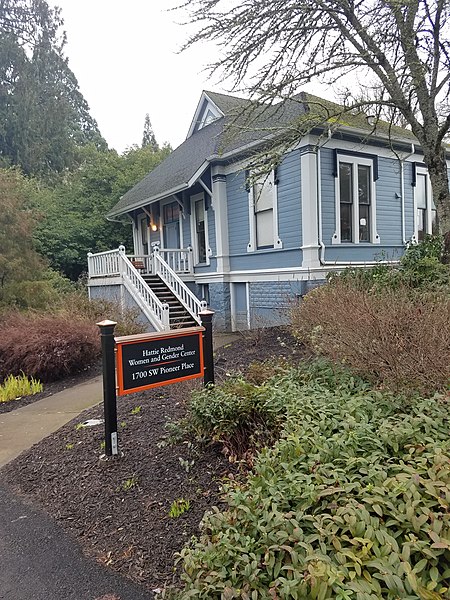
Image: File:Hattie Redmond Women and Gender Center.jpg, Kgt303, CC BY-SA 4.0, via Wikimedia Commons.
Harriet Redmond was an African American suffragette and political activist in Oregon. A student in Kristy Kelly’s Writing for the Web class expanded a fairly bare-bones biography into a far more complete article that documents her personal and family life, activism and legacy, and gives a much more substantial picture of her life and contributions.
Instructor Dr. Rebecca Barnes once again made progress towards bridging Wikipedia’s gender gap with her course Global Climate Change (read more about her efforts here). With a 10-week course that completed in February, her students created biographies of 22 women climate scientists, including atmospheric chemists, population ecologists, and glaciologists.
If you lived in St. Petersburg or Moscow, Russia between the years of 1919 and 1948, you might have heard of or even visited the Moscow State Jewish Theatre, a Yiddish theater company founded by Alexander Granowsky. Initially called the Jewish Theater Workshop and founded in 1919, early productions took place at the Maly Theater in St. Petersburg. This continued until April 1, 1920, when the Russian capital moved to Moscow, as then Soviet Minister of Enlightenment Anatoly Lunacharsky requested that the company make the move as well. Now called the Moscow State Jewish Theatre, Lunacharsky expressed optimism that the company would spread the Bolshevik message to both local and global audiences. Performances put on by the company included short sketches as well as full length productions and during the summer the company would tour the rural provinces. While the Moscow State Jewish Theatre’s plays gave off the impression that they supported the Soviet party, scholars have stated that the company hid critiques of Stalin and inserted Jewish subtext into their performances, all while facing government imposed censorship. The Moscow State Jewish Theatre continued to run until 1948, when it was closed by Soviet authorities. With a history like this, it’s no wonder that this company fascinated one of the students in Benjamin Beresford’s Stalinism – Society and Culture class at Arizona State University. Thanks to the student, the article has been greatly expanded and now features images related to the company.
Scholars & Scientists Program
We are right in the middle of our third Wiki Scholars course to improve women’s suffrage articles on Wikipedia, in collaboration with the National Archives and Records Administration. All participants have been hard at work on their first article, getting ready to choose a second to begin improving. Here is a selection of some of the great work they are doing:
- The article on Lillian Exum Clement was largely missing a major chapter in her life: she was elected to the North Carolina legislature, where she got sixteen of the seventeen bills she proposed passed. Now the article includes a section on her political career, thanks to a Wiki Scholar.
- A Wiki Scholar made significant improvements to the article about Annie Smith Peck, mountaineer, adventurer, suffragist, speaker, and author.
- Temperance and women’s rights advocate, Civil War nurse, and Methodist Episcopal Church minister Amanda Way‘s article was expanded by a Wiki Scholar who more than tripled the number of sources the entry now draws from.
- The biography of Mabel Ping-Hua Lee, Chinese advocate for women’s suffrage who was the “de-facto minister of the Chinese Baptist mission” and head of the First Chinese Baptist Church in New York’s Chinatown, doubled in size since a Wiki Scholar began developing it.
- Mary Birdsall‘s article has likewise seen a vast expansion by a Wiki Scholar, ensuring the public has a clearer picture of the journalist, suffragist, and temperance worker.
- The article about Alice Paul had a section about her work writing the Equal Rights Amendment. A Wiki Scholar added a crucial aspect of the subject: the amendment was renamed in Paul’s honor twenty years later, and its text changed. This is a great example of a significant change by adding a relatively small number of words to an existing article.
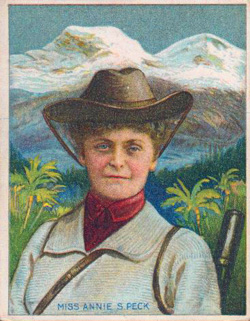
Image: File:AnnieSmithPeckTradingCard.jpg, public domain, via Wikimedia Commons.
Visiting Scholars Program
This month, Wikipedians who have access to academic resources through the Visiting Scholars program contributed to several excellent articles.
Rosie Stephenson-Goodknight, Visiting Scholar at Northeastern University, added to her long list of articles she has created or substantially improved about women writers. Among them this month is Anna Fisher Beiler (1848-1904), a British-born American missionary who served as Secretary of the Bureau for the District of Alaska. Cornelia Collins Hussey (1827-1902) was a philanthropist, suffragist, and writer, as well as a member of the executive committee of the American Woman Suffrage Association. Elizabeth Lownes Rust (1835-1899) was a philanthropist, humanitarian, and missionary who first conceived the Woman’s Home Missionary Society of the Methodist Episcopal Church.
The idea of mineral evolution adds a long-missing historical component to mineralogy. It posits that the mineralogy on planets and moons gets more complicated due to changes in the environment, explaining how the number of mineral species in our solar system has grown from about a dozen to more than 5300. Before long-time Wikipedian and Deep Carbon Observatory Visiting Scholar Andrew Newell started it, the concept did not have a Wikipedia article. He created it in May of last year, and this month brought it all the way up to Good Article status.
The Roman poet Ennius wrote the Annales in the 2nd century BC. The epic poem was about the early history of the Roman state. It has been called a “national epic” and a “carrier of Rome’s culture,” but while it has been very influential on Latin literature, only parts of the poem survive today. Even still, Paul Thomas, Visiting Scholar at the University of Pennsylvania, improved Wikipedia’s article on the subject to Good Article level.
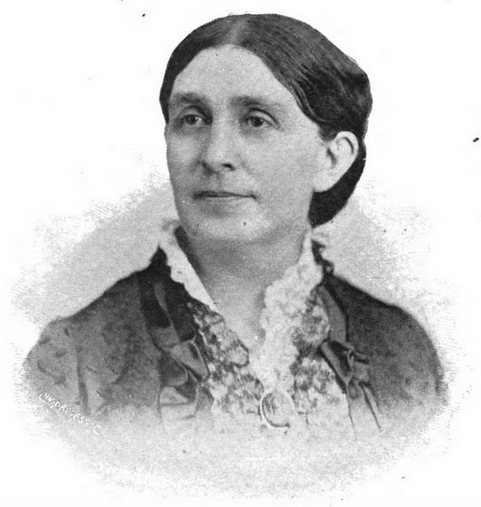
Advancement
The Advancement Team met in person at Wiki Education headquarters in San Francisco during the first week of February. At this meeting, we recapped the recent Wiki Education Board Meeting, revisited our Team Charter, discussed our partnership strategy, kicked off our Annual Planning process, and discussed our communications strategy. Throughout the month, we were busy with fundraising, partnership development, and marketing/communications efforts, as described in the following sections.
Fundraising
In February, we received a grant from the Stanton Foundation totaling $400,000. We received the first payment of this grant, totaling $233,000, as a match to the first payment for our Annual Planning Grant from the Wikimedia Foundation’s Fund Dissemination Committee, which was received in January. We also heard from our partner at Wayne State that a concept note we had submitted together to the Institute of Museum and Library Services (IMLS) related to work on Wikidata in library science education was not accepted to move forward to the full proposal stage. We continue to work with Wayne State on how to move forward with this opportunity.
Throughout the month, Customer Success Manager Samantha Weald conducted extensive research to identify new potential funders and submitted letters of intent to the Peter G. Peterson Foundation and the Smith Richardson Foundation. TJ also had a conversation with one of our current funders about a grant renewal. This conversation resulted in an invitation to submit a proposal for renewal. TJ also traveled to Savannah, GA, USA to attend a meeting hosted by the William and Flora Hewlett Foundation for all of its Education Program grantees. At this meeting, TJ connected with people from all over the world and had several opportunities to discuss Wiki Education’s work. Several people were interested in follow-up conversations and potential partnerships, especially related to our Scholars and Scientists program.
Finally, TJ had several conversations with one of our current funders about hosting a Funder Briefing later in the spring. This briefing will focus on the role of Wikipedia in higher education, science, and media, with invitations going out to nearly 50 funders. Our current funder has agreed to host this briefing and assist with issuing invitations and providing logistical support, including venue.
Partnerships
In February, Wiki Education formally started a partnership with the Conference on College Composition and Communication (CCCC). CCCC is a professional organization of scholars and teachers of composition and rhetoric, advocating for broad and evolving definitions of literacy, rhetoric, and writing. The organization wants to encourage its membership to participate in Wiki Education’s programs to increase their members’ confidence editing Wikipedia and thereby support expert contribution to this global, public resource. CCCC will encourage its members to use Wikipedia as a teaching tool, helping students develop their media and digital literacy. CCCC will also encourage interested members to join a Wiki Scholars course, becoming Wikipedians themselves. The Wikipedia committee of the organization comprises several instructors in our Student Program, so we’re encouraged to see those champions bring Wikipedia to more instructors and students within the discipline.
This month, we formalized a collaboration with the Society of Family Planning, an organization that will facilitate its members learning how to contribute scientific knowledge to Wikipedia through our Wiki Scientists courses.
Communications
Dr. Kate Sheppard, an instructor we’ve been working with since 2017, was awarded the Faculty Experiential Learning Award at Missouri University of Science and Technology this year. Read about it in our blog post!
The Daily Record re-published a piece from 2018 by instructors Tamar Carroll and Lara Licosia about teaching with Wikipedia to counteract the gender content gap.
Also on our blog this month, Ian made a great case for why scientists should be writing Wikipedia. He walks through an MIT study from 2017 that concludes that Wikipedia articles influence published scientific research. When scientists don’t engage in Wikipedia editing, they are not only out-sourcing the public communication of science to Wikipedia volunteers, they are also outsourcing communication within their field. Scientists can now learn how to join the conversation that Wikipedia fosters by joining our virtual Wikipedia writing courses!
Blog posts:
- Professor receives teaching award for having students write Wikipedia (February 4)
- Monthly Report, December 2018 (February 7)
- A solution for historians to engage with the public (February 15)
- 5 career skills historians can achieve by writing for Wikipedia (February 20)
- What linguistics students can do to help preserve indigenous languages (February 21)
- Scientists should write Wikipedia (February 27)
External media:
- Harvard students add safety to Wikipedia, Safety.blr.com (February 6)
- Why Wikipedia often overlooks stories of women in history. Tamar Carroll and Lara Licosia. Reprint of 2018 piece, The Daily Record (February 28)
- Why Wikipedia often overlooks stories of women in history. Tamar Carroll and Lara Licosia. Reprint of 2018 piece, Sunbury News (February 26)
Technology
In February, our main focus was on improving the efficiency of the course onboarding and approval processes and streamlining Wikipedia Expert workflows. The month started with our All Staff meeting, where Chief Technology Officer Sage Ross and Software Developer Wes Reid reviewed the main bottlenecks for both the Wikipedia Student Program and the Wiki Scholars & Scientists Program. Over the rest of the month, Sage and Wes added Dashboard improvements addressing many of the smaller issues we identified, including improvements for Wikipedia Experts to quickly respond to account creation requests from students on campuses where Wikipedia editing is blocked, an easier way to clone a course from a previous term, better emails to encourage instructors to submit their Dashboard courses courses for approval, extra information about which classes have students who haven’t yet been greeted yet by their Wikipedia Expert, and adjustments to how records of good student work get recorded in Salesforce. During the All Staff meeting, we also conducted an accessibility review of the Dashboard, identifying a number of small problems — most of which Wes has since fixed.
In late February, we also began preparing for our upcoming project to customize Salesforce for the Scholars & Scientists Program. Wes will take the lead on this project, which over the next several months will address many of the process bottlenecks in that program that we identified during the All Staff meeting.
Finance & Administration
The total expenses for February were $192,000, just $8K below the budgeted $199,000. As mentioned in the January reporting, the expenses relating to the Board meeting in January were budgeted in both January and February. Where we saw an overage in January, we show that the Board was under budget by ($9K), and the overall spend was right on target. General and Administrative were also on target this month. Fundraising was over by $3K, $1K in benefits catch up, and $2K in travel. Programs was over by $3K, where payroll was over by $13K (we kept staff on longer than previously budgeted and had benefits catch up), under in travel ($8K), indirect costs relating to the All Staff meeting ($6K), over in professional fees by $4K-Over $6K in professional fee relating to fees for services program, and under by ($2K) due to a refund for a cancelled conference. Technology was under by $4K, $3K in employment costs, and $1K in facility costs.
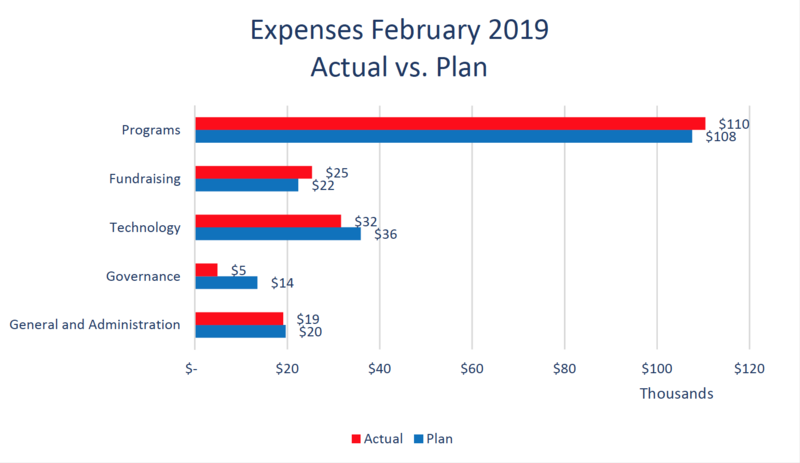
The Year-to-date expenses are $1.4M, $243K under budget of $1.64M. We expected that Fundraising would be under by $156K due to a change in plan for professional services ($149K) and deciding not to engage in a cultivation event ($10K) and is offset by the overage this month in travel (+$2K) and benefits catch up (+1K). Programs are under ($53K) due to a few changes in processes-professional services ($13K), Travel ($36K), and Printing and Reproduction ($11K), Communication ($5K) and Indirect expenses ($26K) while reporting an overage in Payroll ($34K) and furniture and equipment ($4K). General and Administrative are under ($15K) due to a reduction of payroll ($15K) and professional fees mostly relating to Audit and Tax prep ($5K) and administrative costs ($8K) while spending over budget Occupancy-combined direct and indirect (+$13K). The Board is entirely on budget. Technology is under budget by ($19K) as there was a change in plans in utilizing the budgeted professional fees ($17K) and additional rent ($6K) and instead increased Furniture and equipment ($4K).
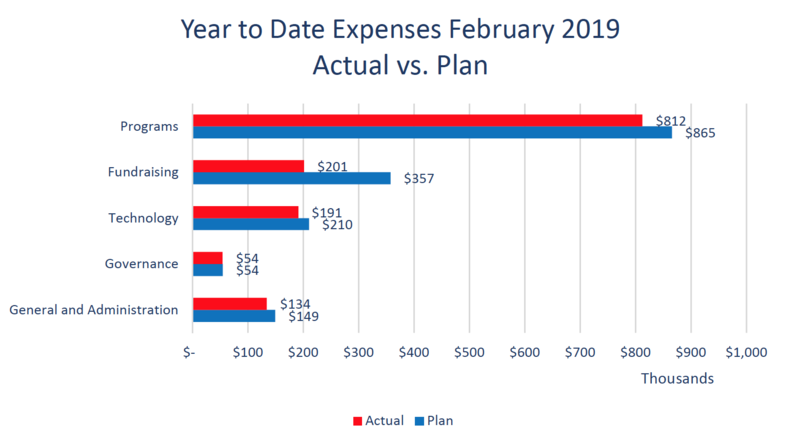
Office of the ED
Current priorities:
- Coordinating and overseeing work on the Annual Plan & Budget for FY 2019/20
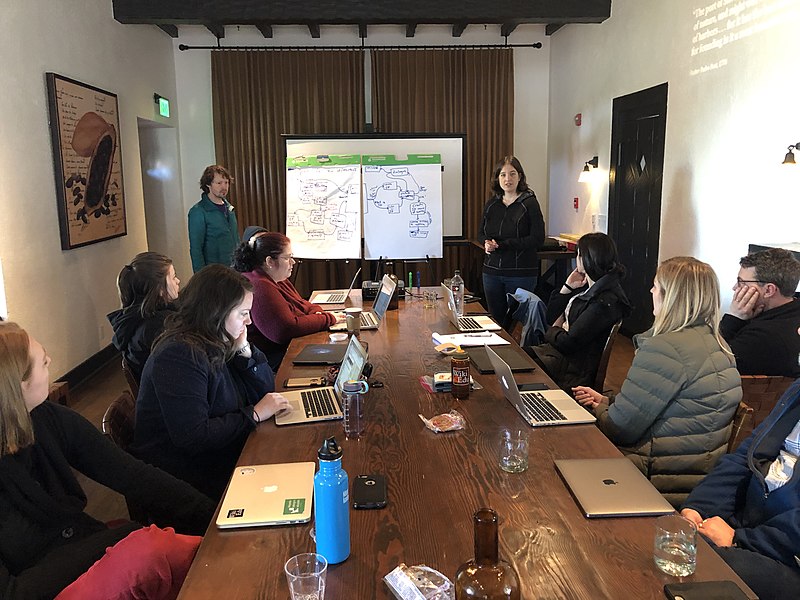
In February, we hosted our second all-staff meeting in the Presidio of San Francisco. With more than half of our staff working remotely, the February meeting provides an opportunity for reflecting on the organization’s performance during the first half of our fiscal year, for group learning exercises, for embarking on the annual planning process, and for increasing the social coherence among the diverse group of people who’re working on making our mission come true.
The all-staff meeting started with a day of individual meetings for the Advancement and the Programs team, so they could coordinate their work for the upcoming year. The second day started with a “celebrating successes” exercise, followed by a presentation about information security and a process-mapping activity aimed at identifying opportunities for smoother workflows and automation. On the third day, Beth Steinhorn, from VQ Volunteer Strategies gave a presentation about volunteer engagement strategies, followed by a discussion of the Programs and Tech team about best practices in the engagement of existing volunteers. The fourth day started with information about upcoming changes in HR and the kick-off of the annual planning process. On the last day, staff engaged in a social activity at one of San Francisco’s escape rooms.
